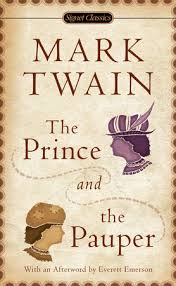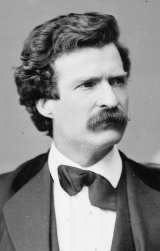The Prince and the Pauper Page #18
The Prince and the Pauper is a novel by American author Mark Twain. It was first published in 1881 in Canada, before its 1882 publication in the United States. The novel represents Twain's first attempt at historical fiction.
“Rise, Sir Miles Hendon, Knight,” said the King, gravely--giving the accolade with Hendon’s sword--“rise, and seat thyself. Thy petition is granted. Whilst England remains, and the crown continues, the privilege shall not lapse.” His Majesty walked apart, musing, and Hendon dropped into a chair at table, observing to himself, “‘Twas a brave thought, and hath wrought me a mighty deliverance; my legs are grievously wearied. An I had not thought of that, I must have had to stand for weeks, till my poor lad’s wits are cured.” After a little, he went on, “And so I am become a knight of the Kingdom of Dreams and Shadows! A most odd and strange position, truly, for one so matter-of-fact as I. I will not laugh--no, God forbid, for this thing which is so substanceless to me is real to him. And to me, also, in one way, it is not a falsity, for it reflects with truth the sweet and generous spirit that is in him.” After a pause: “Ah, what if he should call me by my fine title before folk!--there’d be a merry contrast betwixt my glory and my raiment! But no matter, let him call me what he will, so it please him; I shall be content.” CHAPTER XIII. The disappearance of the Prince. A heavy drowsiness presently fell upon the two comrades. The King said-- “Remove these rags.”--meaning his clothing. Hendon disapparelled the boy without dissent or remark, tucked him up in bed, then glanced about the room, saying to himself, ruefully, “He hath taken my bed again, as before--marry, what shall I do?” The little King observed his perplexity, and dissipated it with a word. He said, sleepily-- “Thou wilt sleep athwart the door, and guard it.” In a moment more he was out of his troubles, in a deep slumber. “Dear heart, he should have been born a king!” muttered Hendon, admiringly; “he playeth the part to a marvel.” Then he stretched himself across the door, on the floor, saying contentedly-- “I have lodged worse for seven years; ’twould be but ill gratitude to Him above to find fault with this.” He dropped asleep as the dawn appeared. Toward noon he rose, uncovered his unconscious ward--a section at a time--and took his measure with a string. The King awoke, just as he had completed his work, complained of the cold, and asked what he was doing. “‘Tis done, now, my liege,” said Hendon; “I have a bit of business outside, but will presently return; sleep thou again--thou needest it. There--let me cover thy head also--thou’lt be warm the sooner.” The King was back in dreamland before this speech was ended. Miles slipped softly out, and slipped as softly in again, in the course of thirty or forty minutes, with a complete second-hand suit of boy’s clothing, of cheap material, and showing signs of wear; but tidy, and suited to the season of the year. He seated himself, and began to overhaul his purchase, mumbling to himself-- “A longer purse would have got a better sort, but when one has not the long purse one must be content with what a short one may do-- “‘There was a woman in our town, In our town did dwell--’ “He stirred, methinks--I must sing in a less thunderous key; ’tis not good to mar his sleep, with this journey before him, and he so wearied out, poor chap . . . This garment--‘tis well enough--a stitch here and another one there will set it aright. This other is better, albeit a stitch or two will not come amiss in it, likewise . . . These be very good and sound, and will keep his small feet warm and dry--an odd new thing to him, belike, since he has doubtless been used to foot it bare, winters and summers the same . . . Would thread were bread, seeing one getteth a year’s sufficiency for a farthing, and such a brave big needle without cost, for mere love. Now shall I have the demon’s own time to thread it!” And so he had. He did as men have always done, and probably always will do, to the end of time--held the needle still, and tried to thrust the thread through the eye, which is the opposite of a woman’s way. Time and time again the thread missed the mark, going sometimes on one side of the needle, sometimes on the other, sometimes doubling up against the shaft; but he was patient, having been through these experiences before, when he was soldiering. He succeeded at last, and took up the garment that had lain waiting, meantime, across his lap, and began his work. “The inn is paid--the breakfast that is to come, included--and there is wherewithal left to buy a couple of donkeys and meet our little costs for the two or three days betwixt this and the plenty that awaits us at Hendon Hall-- “‘She loved her hus--’ “Body o’ me! I have driven the needle under my nail! . . . It matters little--‘tis not a novelty--yet ’tis not a convenience, neither. . . . We shall be merry there, little one, never doubt it! Thy troubles will vanish there, and likewise thy sad distemper-- “‘She loved her husband dearilee, But another man--’ “These be noble large stitches!”--holding the garment up and viewing it admiringly--“they have a grandeur and a majesty that do cause these small stingy ones of the tailor-man to look mightily paltry and plebeian-- “‘She loved her husband dearilee, But another man he loved she,--’ “Marry, ’tis done--a goodly piece of work, too, and wrought with expedition. Now will I wake him, apparel him, pour for him, feed him, and then will we hie us to the mart by the Tabard Inn in Southwark and--be pleased to rise, my liege!--he answereth not--what ho, my liege!--of a truth must I profane his sacred person with a touch, sith his slumber is deaf to speech. What!” He threw back the covers--the boy was gone! He stared about him in speechless astonishment for a moment; noticed for the first time that his ward’s ragged raiment was also missing; then he began to rage and storm and shout for the innkeeper. At that moment a servant entered with the breakfast. “Explain, thou limb of Satan, or thy time is come!” roared the man of war, and made so savage a spring toward the waiter that this latter could not find his tongue, for the instant, for fright and surprise. “Where is the boy?” In disjointed and trembling syllables the man gave the information desired. “You were hardly gone from the place, your worship, when a youth came running and said it was your worship’s will that the boy come to you straight, at the bridge-end on the Southwark side. I brought him hither; and when he woke the lad and gave his message, the lad did grumble some little for being disturbed ‘so early,’ as he called it, but straightway trussed on his rags and went with the youth, only saying it had been better manners that your worship came yourself, not sent a stranger--and so--”
Translation
Translate and read this book in other languages:
Select another language:
- - Select -
- 简体中文 (Chinese - Simplified)
- 繁體中文 (Chinese - Traditional)
- Español (Spanish)
- Esperanto (Esperanto)
- 日本語 (Japanese)
- Português (Portuguese)
- Deutsch (German)
- العربية (Arabic)
- Français (French)
- Русский (Russian)
- ಕನ್ನಡ (Kannada)
- 한국어 (Korean)
- עברית (Hebrew)
- Gaeilge (Irish)
- Українська (Ukrainian)
- اردو (Urdu)
- Magyar (Hungarian)
- मानक हिन्दी (Hindi)
- Indonesia (Indonesian)
- Italiano (Italian)
- தமிழ் (Tamil)
- Türkçe (Turkish)
- తెలుగు (Telugu)
- ภาษาไทย (Thai)
- Tiếng Việt (Vietnamese)
- Čeština (Czech)
- Polski (Polish)
- Bahasa Indonesia (Indonesian)
- Românește (Romanian)
- Nederlands (Dutch)
- Ελληνικά (Greek)
- Latinum (Latin)
- Svenska (Swedish)
- Dansk (Danish)
- Suomi (Finnish)
- فارسی (Persian)
- ייִדיש (Yiddish)
- հայերեն (Armenian)
- Norsk (Norwegian)
- English (English)
Citation
Use the citation below to add this book to your bibliography:
Style:MLAChicagoAPA
"The Prince and the Pauper Books." Literature.com. STANDS4 LLC, 2024. Web. 27 Dec. 2024. <https://www.literature.com/book/the_prince_and_the_pauper_315>.




Discuss this The Prince and the Pauper book with the community:
Report Comment
We're doing our best to make sure our content is useful, accurate and safe.
If by any chance you spot an inappropriate comment while navigating through our website please use this form to let us know, and we'll take care of it shortly.
Attachment
You need to be logged in to favorite.
Log In